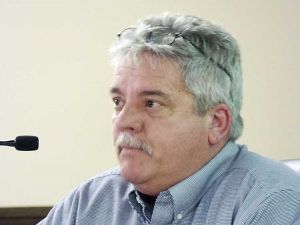
Multiple providers tearing up city streets, city manager says; should there be just one choice?
The Peachtree City Council at a May 1 retreat session discussed residential solid waste service providers, the damage to asphalt done by garbage trucks and potential options for the future. The discussion will continue during upcoming budget talks.
Peachtree City in 2009 adopted the current, non-exclusive solid waste agreement. Today, there are three companies providing garbage pick-up services in the city. Front and center in the discussion was the damage done to city streets by having multiple solid waste providers.

“By having multiple providers, we’re reducing the longevity of our road network,” said City Manager Jon Rorie. “So are we being fiscally-responsible by having multiple providers or is there a better way?”
That question led to a presentation on the impact of various types of vehicles on asphalt streets. The data was tallied using the Equivalent Single-Axle Load (ESAL) methodology.
Data showed that it takes 879 pick-up trucks or 7,037 cars to equal the damage to asphalt done one garbage truck.
A breakdown illustrating one neighborhood showed that one garbage truck accounts for 47 percent of the ESAL pavement load. The point was made that with three garbage providers, hence three times the amount of pavement load in some areas, the life span of the asphalt is significantly reduced and the expense of repaving comes much sooner.
With that, the discussion turned to the options of leaving things the way they are now with a non-exclusive franchise agreement, creating a city department for solid waste collections, moving to a open market operation with no franchises or fees or moving to a single provider contract and franchise.
That portion of the discussion began with Rorie saying he did not want to see the city get into the solid waste collection business.
Current providers in Peachtree City include Pollard, with a residential rate of $46 per quarter, Republic at $52.50 per quarter and Waste Industries at $46 per quarter. Republic serves more than 50 percent of Peachtree City homes.
Looking at the idea of having one provider, the result would mean fewer trucks on the road with less asphalt damage.
Aside from the situation remaining as it is today, staff gathered data on the approach used by 26 cities in the region. The cities surveyed ranged from $31.35 per quarter for residential garbage service to $96.30. The lowest of the 26 cities was Fayetteville at $31.35 per quarter.
“There is no single right answer, no easy answer,” said Rorie.
He continued, saying there is a cost to maintaining the status quo in terms of increased road damage and more frequent paving costs.
With a single franchise, the city would doubtless get phone calls when service does not meet customer expectations, he added.
If the council decided to go to a single provider, it would mean soliciting bids through a request for proposal.
“It’s pay me now or pay me later. It might be the right time to re-evaluate or it might not,” Rorie said near the close of the discussion.
The council is expected to continue the discussion during the upcoming budget talks.
As is often the case, Rorie began the presentation by restating the city’s mission statement, which includes the provision of providing consistency in the delivery of municipal services in a fiscally-responsible manner.





